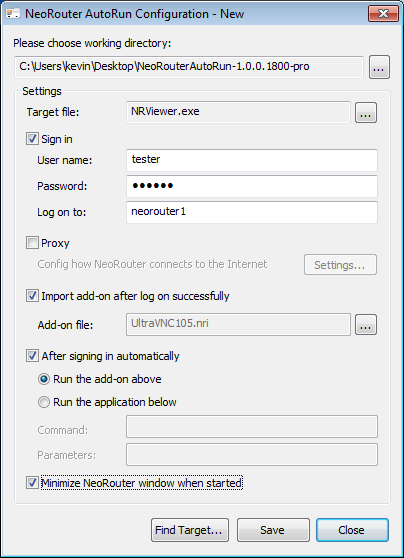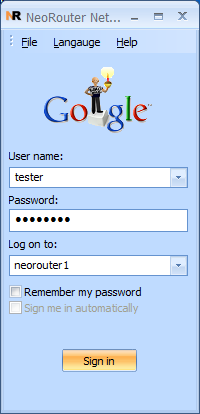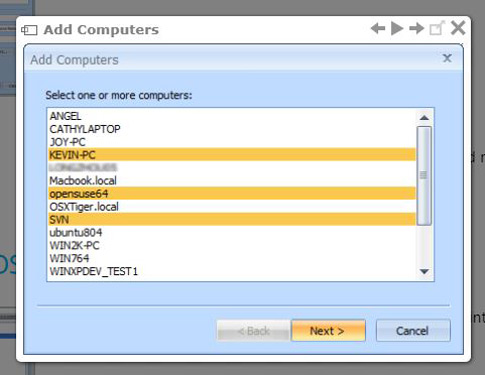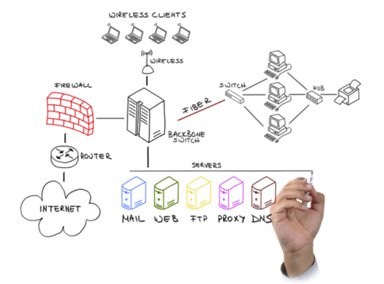
- #Neorouter ip configuration for free
- #Neorouter ip configuration how to
- #Neorouter ip configuration install
- #Neorouter ip configuration full
- #Neorouter ip configuration android
I used vpnc from linux, I'm not sure about the mac guys. The windows client was poor, but we mostly didn't need to use it, and in fact mostly didn't use windows.

That said, after working server support (up to about 4 years ago) for a company where most of our clients had their own VPNs, and every one was different, I'd have to say that when well configured, the Cisco ones were the easiest for us to use.
#Neorouter ip configuration full
The configuration is full of detail you probably don't want to know about, but I'd look for a system built on top of one of these protocols. There are any number of clients for these. Looking around the private VPN providers, there are a small number of protocols in widespread use. You have the option to choose hosted or standalone domains when you create them, so cloud-dependency is just a feature, not a requirement: It was fairly easy to set up and access files
#Neorouter ip configuration android
I tested it between my home PC and an Android phone. Work remotely and access office applications, files, emails and printers. NeoRouter mobilizes your office network and enables you and your teammates to work securely from anywhere.

#Neorouter ip configuration for free
A table of features for free and professional versions can be found here.
#Neorouter ip configuration how to
It's made specifically for use by homes and small business and has detailed documentation with slides and videos on how to set up and configure. It's a cross-platform VPN solution that requires little configuration. However, I want to offer my thanks to all that responded.Īnother option is NeoRouter. So I awarded the bounty to the one that looked the most promising. In this case I would have liked to split the bounty more or less equally across all the answers, but SE offers no way to do that. It is unfortunate that none of them was an obvious hands-down winner the best of the lot in my judgement still requires that I actually go fool with it to see if it passes the configurability tests and there was not time in the bounty window to do that. It served its purpose in attracting a number of fairly interesting answers. Isn't all the VPN machinery already in our MS servers and Linux boxes? Why do I want to add yet another party to the process?ĮDIT: Bounty awarded. The benefit to me seems pretty small, if not negative. It appears that all the vendors are trying to insert some permanent dependency in our networks to make us pay an annual fee. If you don't have a recommendation for an easily configured (that means has good documentation about how to do it!) VPN client, then maybe a suggestion for where to look for appropriate documentation would be really useful (even if that's technically out of scope for SR).Īll two of the answers provided so far seem to come with some kind of cloud dependency Perhaps my problem isn't the VPN client maybe it is just discovering how to get everything configured. Is it the case the everybody else on the planet is capable of doing this and we just don't know how (I'd believe that)? If you've had good success, please respond with your solution. I'm astonished at how hard this seems to do.


#Neorouter ip configuration install
A VPN client that we can install on laptops and systems outside our server LAN.We have one internal LAN connected to the MS server, a Linux server, Cisco router, and 2 printers at fixed IP addresses (192.168.1.x) and modest number (~~20) DHCP-allocated IP-address workstations. Finally, they claim support for this is ending. Cisco provides their own VPN client, which one would expect to be compatible with thier router, but we cannot discover how to make it work reliably the Cisco website docs are pretty much useless, and user queries at their site are full of complaints about it not working with no responses from Cisco people. We are looking for a VPN client that isn't full of trap doors. We bought this because it declared it addressed the VPN problem. We have a Cisco Router RV082 that purportedly supports VPNs. We have some offsite (travelling laptops, stationary workstations) systems that are modern Windows-based. We have a rather conventional Windows shop with MS Server 2003 and corresponding Exchange services at a single site.


 0 kommentar(er)
0 kommentar(er)
